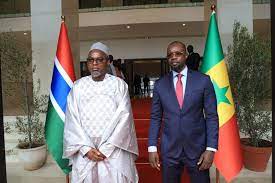Senegal’s president is the appointed mediator in talks with Burkina Faso, Mali and Niger, after the three members announced they were quitting the Economic Community of West African States (ECOWAS).
His prime minister is committed to strengthening the institutions within the bloc.
At a time when Burkina Faso, Mali and Niger have decided to quit the Economic Community of West African States (ECOWAS), Senegalese Prime Minister Ousmane Sonko, who enjoys great popularity in these countries because of his pan-Africanist and sovereignist ideas, is calling for the strengthening of the regional organisation.
During a meeting with the visiting Gambian Vice President Muhammad B.S. Jallow in Dakar on Monday, August 5, PM Sonko expressed his disagreement with the fractionalist approach that he believes would further weaken West African nations.
“We have taken a clear and irrevocable line. Since the head of state came to power, our discourse and our diplomatic program have been clear. Our logic is to work to bring African countries closer together,” stressed Sonko, leader of the Pastef party, which came to power last March.
He nominated Bassirou Diomaye Faye, then the party’s secretary-general, as his running mate in the last presidential election after his own candidacy was annulled by the constitutional council, to take the group’s sovereignist vision to the top of the Senegalese state.
After appointing his former political mentor as head of government, President Faye made “African integration” a fundamental priority of his foreign policy.
Following his inauguration, he visited a number of Ecowas countries, including Burkina Faso and Mali, which decided to leave the bloc to form the Alliance of Sahel States (AES) with neighbouring Niger.
This decision stems from the desire of the regional institution’s leaders to reinstate by force President Mohamed Bazoum, who was overthrown by a military coup in July 2023. The other two countries have also been under military rule.
They have therefore decided to join forces to tackle security threats, in particular the jihadist violence that has plagued their territories for several years.
At the last ECOWAS summit, Bassirou Diomaye Faye was appointed to facilitate talks with the ESA.
“We cannot encourage a new division at a time when countries all over the world are striving to strengthen themselves within solid entities,” Sonko reminded the wantaway members.
Whatever the validity of the reasons put forward, Ousmane Sonko urged the three states in conflict with Ecowas to reconsider their position so as not to undo the work done in the course of over half a century.
“It is obvious that our nations, taken in isolation, have very little chance of achieving the great leap forward long awaited by their peoples,” he declared, calling for an intensification of international and bilateral relations.
On August 3, during a television interview on the occasion of Niger’s Independence Day, General Abdourahamane Tiani, head of the military junta, confidently declared that “Ecowas is after us” and threatened reprisals against the bloc if it took measures against nationals of AES countries, as proposed by Ecowas Commission president Omar Alieu Touray.
ODL/ac/sf/lb/as/APA


